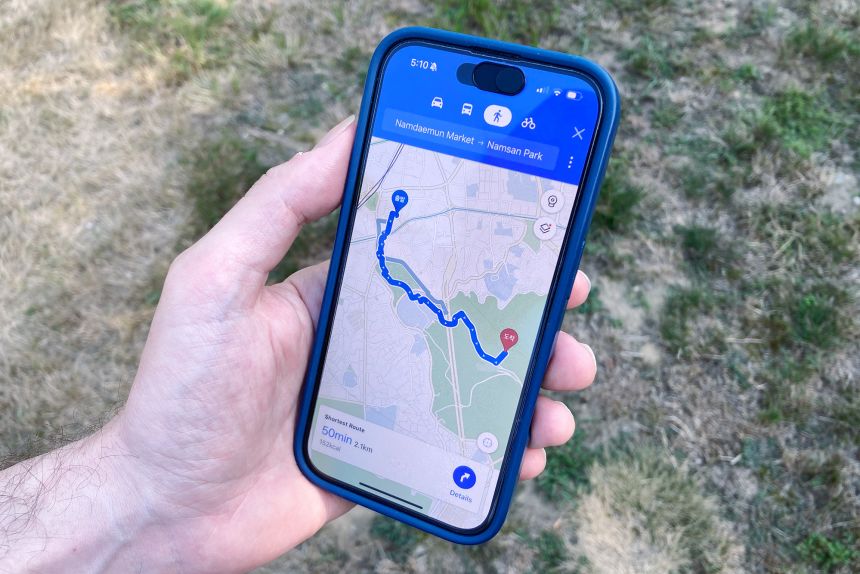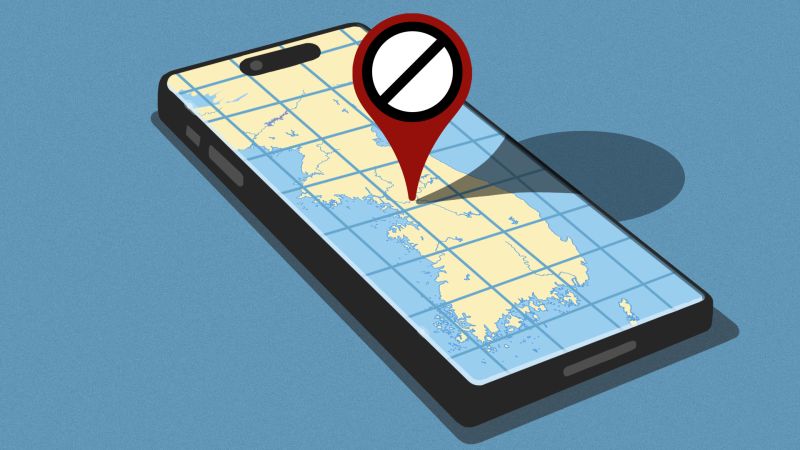When Taiwanese traveler Eric Weng goes to South Korea, he resigns himself to toggling between three different map applications to navigate his way around.
That’s because Google Maps, ubiquitous in much of the world, doesn’t fully work in South Korea. So each year, millions of visitors like Weng must download alternative Korean apps like Kakao Map and Naver Map, which lack the detailed functions they’ve come to expect from Google.
“It’s tiring because you need to download three apps, then juggle three to find a way to where you want to go,” said Weng.
By all other measures, South Korea is a tech-savvy tourist haven. Most overseas platforms have no such issue operating, including other Google products like Gmail and YouTube.
While it’s not the only country where Google Maps doesn’t fully work, South Korea stands out in stark contrast to other nations like China, Russia or Cuba, which have long had fractious relationships with the United States. By contrast, South Korea is a longtime US ally with American troops stationed in the country, as well as one of Asia’s most developed economies.
At the heart of this issue lies a set of map data owned by the South Korean government – which Google says it needs to create a comprehensive map of the country, complete with navigation instructions. For nearly 20 years, Google has asked South Korea to export that data and authorities have repeatedly refused, citing national security concerns.
But experts say the issue is more complicated than that.
This decades-long struggle began over geopolitical tensions, they say, and has since expanded to larger questions of “digital sovereignty” and market dominance. In other words: who gets to control a country’s data? Who benefits, and at what cost? What happens to local companies when a multinational tech giant enters the scene?
These are the questions now being debated by South Korean authorities, who are expected to approve or deny Google’s latest export request in early October.
For tourists like Weng, the decision brings the hope that Google Maps may finally come to South Korea – which would “make life much easier,” he said.

The beef between South Korea and Google began in 2008, when Google Maps labeled some Korean locations by their Japanese names, according to Soyun Ahn, an assistant professor of communications at Boston College who specializes in global platform governance.
The disputed names are a highly sensitive topic in South Korea, which was colonized by Japan for more than three decades in the early 1900s. Though the two nations have since normalized relations, tensions often flare, especially regarding unresolved historical disputes.
South Korean authorities repeatedly asked Google to change the location names – but Google resisted and became embroiled in several other South Korean map-labeling controversies in the following years, Ahn wrote in a paper about the topic.
“The two entities have been in a power struggle for two decades,” she told CNN. “They’ve had a rocky relationship from the very beginning.”
By the early 2010s, South Korea had created a 1:25,000 scale satellite map – which means each unit on the map corresponds to 25,000 units on the ground (for example, one inch on the map could represent 25,000 inches on a road). It was made freely available online, including to users overseas.
This 1:25,000 map is what Google Maps currently uses to depict South Korea. That’s why when you look at the country on the app, it shows a lot of basic geography including city locations, roads and streets, even many attractions and train lines.
But what it doesn’t show are detailed walking or driving instructions. When you try to plot a route, Google Maps will simply show a message that reads: “Can’t seem to find a way there.”

The reason, Google claims, is because it requires South Korea’s more detailed 1:5,000 map – where each unit on the map represents 5,000 units on the ground.
Soon after this advanced map was released in 2016, Google submitted a formal request to access the data – which, under South Korean law, cannot be exported to overseas servers without government approval.
After a series of hearings and closed-door meetings that at times turned heated (“Congresspeople were almost shouting,” Ahn said), South Korea firmly rejected the request, citing the fact that Google had declined to remove sensitive military data from its existing satellite maps.
In a blog post published in early August, Google said the satellite images used in its maps are captured by other companies then sold through open markets – so even if Google Maps blurred sensitive locations in South Korea, they would still be visible in the original satellite imagery, which anyone can buy.
“Nevertheless, to address the Korean government’s concerns, Google will take additional security measures, including blurring sensitive facilities on Google Maps and Google Earth,” it said in the blog post.
But disagreements continue roiling over whether Google should be given the more detailed map data – and, some experts argue, whether it needs it at all.

On the surface, the main issue is national security; South Korea lawmakers argue that exporting its 1:5,000 map could reveal military bases and government facilities.
But some experts are skeptical about these risks.
“The national security concern is probably overstated, because the maps are available widely,” said Scott McQuire, a professor of media and communications at the University of Melbourne, who researches the use of media technologies in cities.
Google made the same argument, writing in its blog post that the 1:5,000 map “has already undergone a rigorous government security review, with sensitive information removed.” It pointed out that domestic Korean mapping apps like Kakao and Naver are “also based on this data.”
CNN has reached out to South Korea’s National Geographic Information Institute, which produces and distributes the maps in question.
Experts say other, broader concerns may be playing a role.
A big fear is that Google Maps’ dominance could displace competitors like Naver and Kakao, if it was allowed into the country.
“I think that there is a kind of interest in having homegrown mapping platforms,” said McQuire, pointing to family-run conglomerates like Samsung and LG that have dominated the economy for decades.

Naver and Kakao have also publicly protested against allowing Google Maps to use the data, arguing it’s not fair to Korean companies that pay taxes and follow local regulations, Ahn said.
The sentiment is widespread; a recent survey of 239 spatial information companies in South Korea found that 90% opposed exporting the map data to Google, citing potential harm to sales and job losses.
There’s also just no real incentive for South Korea to accept Google’s request, Ahn said. It wouldn’t bring a significant economic boost; there’s no public demand, since all residents use Naver and Kakao anyway; and the impact on tourists is negligible compared to their other concerns.
But for Google, South Korea’s maps could be highly valuable.
Most of South Korea’s 51 million residents use smartphones and have big digital footprints, which could allow Google to use the map data for other lucrative purposes, experts say.
For example, Google could potentially replace local providers on platforms that rely on online maps – like Airbnb and Uber, which do work in South Korea but use Korean mapping tools. The number of apps relying on Korean mapping tools – like rideshare platform Kakao T – could dwindle with Google on the scene.
That could open the door to an enormous amount of information on user behavior, like how people are moving or interacting with online services.
“I think there (would) be that level of concern – that it’s not just the availability of the map as a map, but the map becomes a baseline for a whole lot of other services,” McQuire said.

Opinions are split on whether Google even needs the data, as it claims.
Both Ahn and McQuire argued that Google has enough other tools at its disposal that it could create its own detailed map of South Korea if it wanted – suggesting the company may be hoping to avoid the cost and labor of doing so. After all, Ahn claimed, Google doesn’t request data directly from the government in many other countries where it does have full mapping and navigation services.
In a statement to CNN, however, Google insisted that the 1:25,000 map is “fundamentally insufficient for the precision required for modern turn-by-turn navigation, especially for densely populated urban areas, or for features like detailed walking and cycling guidance on narrow roads and alleyways.”
It uses both 1:25,000 and 1:5,000 maps in other countries, with the less detailed version suitable for “areas with no buildings, such as deserts, oceans, and mountain ranges,” it said.
Google said when it buys map data from third-party providers in other nations, it requires the data to be “legally compliant in their respective countries.”
“We have not experienced issues with data export approvals in this process so far,” it said.

Vivian Chen, a Taiwanese traveler who goes to South Korea three or four times a year, says the translations on the South Korean apps are often confusing.
While the Korean apps offer an English interface, it can be clunky and hard to use. She can’t find the live navigation tool that, in Google Maps, would give real-time directions as she walks. And addresses often don’t translate well, requiring a second or third app to help find the right location.
Larger attractions like shopping malls or famous palaces are easier to find quickly, “but it’s very hard to find the English names for smaller stores,” she said – making her reluctant to venture off the beaten path or explore lesser-known locations.
This could all change in the coming months when an inter-government council – representing the ministries of trade, foreign affairs, national defense, intelligence and security and others – makes its decision.
“It’s very likely they will reject the (request) again” unless Google makes major concessions or shows a willingness to cooperate with the government on their concerns, said Ahn.
However, she added, it’s possible South Korea could approve the request as a strategic move to win other concessions from the US – especially in trade.
The two countries struck a trade deal in late July, which calls for 15% tariffs on goods from South Korea, but the finer details are still being hammered out in ongoing talks. “With the new Trump administration, I can only imagine the pressure will be so much more,” Ahn said.
Even beyond this decision, Google is facing challenges in other parts of the world – with a major federal antitrust case ongoing in the US, lodged by the Department of Justice, and reports of another antitrust probe targeting Google Maps specifically.

“For a long time, people thought about Google as a public service – it’s all free, we don’t pay, it’s ‘do no evil,’” said McQuire. “Well, the attitude’s changing now, and people can see Google more clearly for what it is – which is a very, very large enterprise, which produces some really clever products, but is enormously intrusive in its data gathering capacities.”
Those implications are front of mind for South Korea – with Google standing to potentially gain a lot if the government decides in their favor in October. For tourists, the confusion is likely to continue until then – or perhaps until local apps get a lot more visitor-friendly.
Chen, who’s due to return to South Korea in December, says the lack of clear directions is “so frustrating and irritating that it makes me almost not want to come.”
“How can it be so inconvenient?” she said. Seoul is “such a modern city, how can it have such a terrible shortcoming?”

